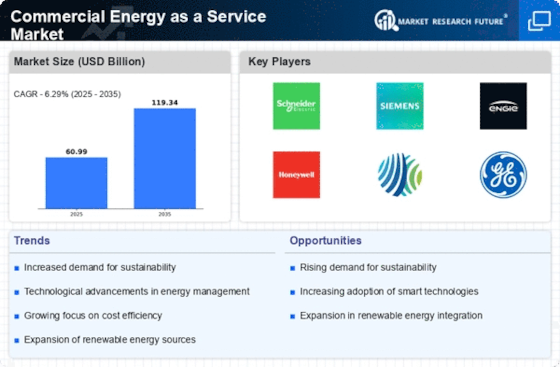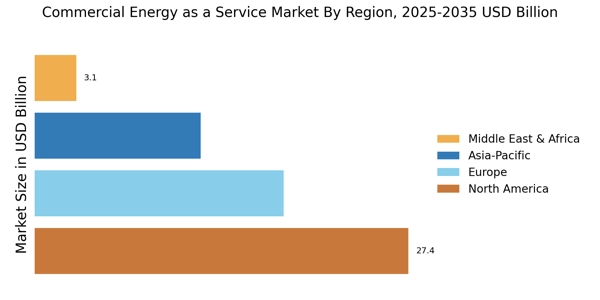Rising Energy Costs
The escalating costs of energy are a primary driver for the Commercial Energy as a Service Market. Businesses are increasingly seeking cost-effective solutions to manage their energy expenditures. As energy prices continue to rise, organizations are compelled to explore alternative energy models that offer predictable pricing and reduced operational costs. The Commercial Energy as a Service Market provides a viable solution by allowing companies to outsource their energy management, thus mitigating the financial burden associated with fluctuating energy prices. This trend is particularly evident in sectors with high energy consumption, where the potential for savings can be substantial. Furthermore, the market is projected to grow as more businesses recognize the financial advantages of adopting energy-as-a-service models, which can lead to improved cash flow and enhanced competitiveness.
Corporate Sustainability Goals
The growing emphasis on corporate sustainability is a significant driver for the Commercial Energy as a Service Market. Many organizations are setting ambitious sustainability targets, aiming to reduce their carbon footprint and enhance their environmental stewardship. The adoption of energy-as-a-service models allows businesses to transition to cleaner energy sources without the upfront capital investment typically associated with renewable energy projects. This approach not only supports corporate sustainability goals but also enhances brand reputation and customer loyalty. According to recent studies, companies that prioritize sustainability are more likely to attract environmentally conscious consumers. As a result, the Commercial Energy as a Service Market is poised for growth as more businesses seek to align their energy strategies with their sustainability objectives.
Advancements in Energy Technology
Technological advancements play a crucial role in shaping the Commercial Energy as a Service Market. Innovations in energy storage, smart grid technology, and renewable energy sources are transforming how businesses consume and manage energy. The integration of these technologies enables companies to optimize their energy usage, reduce waste, and enhance efficiency. For instance, the deployment of smart meters and IoT devices allows for real-time monitoring and management of energy consumption, leading to more informed decision-making. As these technologies become more accessible and affordable, the Commercial Energy as a Service Market is likely to experience significant growth. The ability to leverage cutting-edge technology not only improves operational efficiency but also aligns with the increasing demand for sustainable energy solutions.
Regulatory Frameworks and Incentives
Supportive regulatory frameworks and incentives are pivotal in driving the Commercial Energy as a Service Market. Governments worldwide are implementing policies that encourage the adoption of energy-efficient technologies and renewable energy solutions. These regulations often include tax incentives, grants, and subsidies aimed at reducing the financial barriers associated with transitioning to energy-as-a-service models. As businesses navigate these regulatory landscapes, they are increasingly motivated to adopt energy-as-a-service solutions that comply with environmental standards and benefit from available incentives. This trend is likely to accelerate the growth of the Commercial Energy as a Service Market, as organizations recognize the dual benefits of regulatory compliance and cost savings.
Increased Demand for Energy Resilience
The demand for energy resilience is becoming a critical driver for the Commercial Energy as a Service Market. Businesses are increasingly aware of the vulnerabilities associated with traditional energy supply chains, particularly in the face of natural disasters and geopolitical tensions. As a result, organizations are seeking solutions that provide reliable and uninterrupted energy supply. Energy-as-a-service models offer flexibility and resilience, allowing businesses to diversify their energy sources and enhance their energy security. This shift is particularly relevant for industries that rely heavily on continuous energy supply, such as manufacturing and healthcare. The Commercial Energy as a Service Market is likely to benefit from this trend, as companies prioritize energy resilience as a key component of their operational strategy.

















